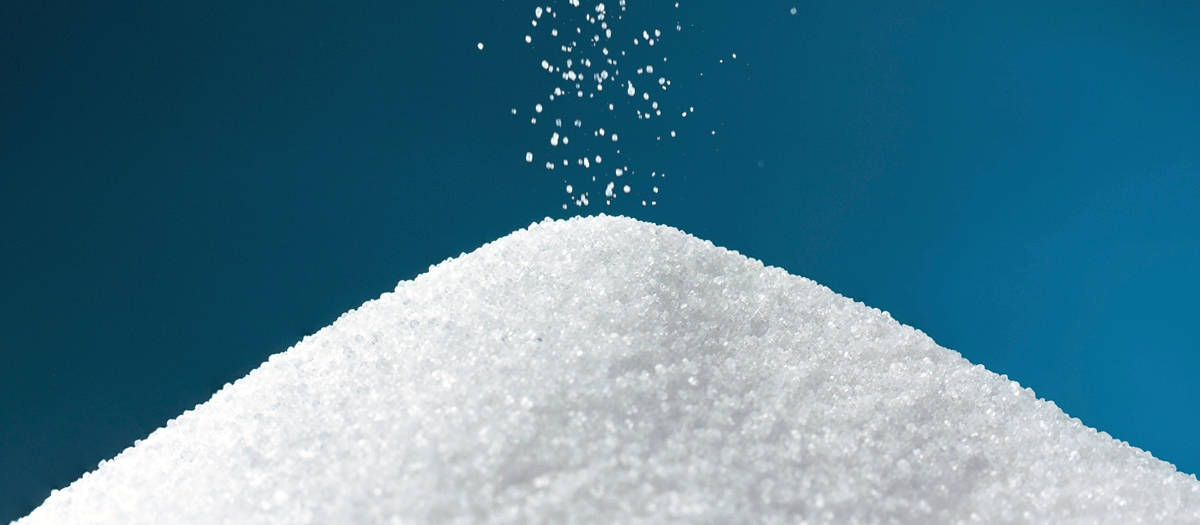
By Tamzyn Murphy (RD)
Salt-sensitivity 101
Approximately a quarter of normotensive and half of hypertensive people are thought to be salt sensitive, meaning that their blood pressure increases dramatically in response to dietary salt intake [1]. The remainder of people appear to be largely resistant to salt’s hypertensive effects. Being sensitive to dietary salt has been associated with increased risk of hypertension, cardiovascular events and general mortality [1].
Are we blaming the wrong white crystal?
However, Dr DiNicolantonio, salt researcher and author of The Salt Fix, hypothesises that salt sensitivity may be mediated by high sugar (or more specifically, high fructose) intake [2]. Sugar causes hypertension via the renin-angiotensin system, resulting in renal retention of salt and water [3]. Sugar also increases peripheral vascular resistance by increasing uric acid and reducing vasodilatory nitric oxide [2]. If Dr DiNicolantonio’s hypothesis is correct, then sugar rather than salt is responsible for “salt-sensitive” rises in hypertension and the associated increase in cardiovascular disease risk [4]. In turn, this implies that reduction of sugar, rather than salt, in the diet is important for reducing blood pressure. Interestingly, high salt intake increases the number of glucose transporters on cell membranes and assists with insulin-independent glucose disposal, thereby lowering blood glucose concentrations [2].
Perhaps then, dietary sugar affects pathways involved in increasing blood pressure (e.g. renin-angiotensin system, uric acid, nitric oxide) more in so-called “salt-sensitive” people than in others. And perhaps “salt-sensitive” individuals retain more salt, as an adaptive physiological response to assist with the disposal of excess sugar? This is a game-changer! Bring on more research!
Measuring salt sensitivity
Salt sensitivity is incredibly difficult to diagnose/measure outside of a research context [5]. However, if someone is salt sensitive, one would assume that if they ate more salt (e.g. in the form of bone broth and adding more salt to food), their blood pressure would rise dramatically. However, if Dr DiNicolantonia is correct, then in the context of a low sugar diet (such as ketogenic or low carbohydrate high fat (LCHF) diets), perhaps one wouldn’t see such a rise in blood pressure, nor be able to identify a “salt sensitive” person; because a more appropriate description of their blood pressure response would be “sugar-sensitive”. Indeed, LCHF diets are known to lower blood pressure, despite recommendations to increase dietary salt intake [6].
Clinical cases: what about patients with lipedema and lymphedema – is dietary salt a problem for them?
Some people are concerned that dietary salt remains a problem in certain conditions. Two such conditions are lipedema and lymphedema. Let’s take a closer look…
Lipedema is a condition characterised by symmetrical fat deposition beneath the skin of the legs, present in approximately 1 in 10 women [7]. While it is more common in overweight and obese women, it can also be present in normal weight women. Losing weight can help reduce overall fat, however, doesn’t appear to reduce the relative disproportionate fat located on the legs [8]. I can’t find any research indicating that any dietary factors, including salt, have been identified which can improve or worsen the condition.
Lymphedema refers to intercellular lymph fluid retention and swelling in one or more arms or legs, usually as a result of impaired lymph drainage due to lymph node damage or resection (e.g. as part of surgical cancer treatment) [9]. Dietary interventions for lymphedema traditionally include dramatically reducing dietary salt intake [10]. However, evidence indicates that dietary salt may not increase circulating fluid volume [11], whereas higher blood glucose (and insulin) concentrations may increase it [2]. Additionally, hepatic fructose metabolism (i.e. processing of part of sugar in the liver) impairs blood vessel dilation and increases peripheral vascular resistance and blood pressure [12]. This may be expected to increase fluid seepage into the extracellular space (between the cells and outside of the blood and lymph vessels), thereby exacerbating lymphedema. Therefore, perhaps reducing consumption of refined carbohydrates and sugar rather than salt should be the target of dietary lymphedema medical nutritional therapies?
Summary
It appears that sugar rather than salt may be the true culprit behind hypertension and associated cardiovascular disease risk in salt-sensitive people with a high salt intake. Healthcare professionals implementing an LCHF diet in their patients should monitor blood pressure closely when recommending increases in dietary salt consumption and… prepare to be pleasantly surprised.
References
- Rodriguez-Iturbe, B. and N.D. Vaziri, Salt-sensitive hypertension—update on novel findings. Nephrology Dialysis Transplantation, 2007. 22(4): p. 992-995.
- DiNicolantonio, J.J., V. Mehta, and J.H. O’Keefe, Is Salt a Culprit or an Innocent Bystander in Hypertension? A Hypothesis Challenging the Ancient Paradigm. The American Journal of Medicine, 2017. 130(8): p. 893-899.
- Madero, M., et al., Dietary Fructose and Hypertension. Current Hypertension Reports, 2011. 13(1): p. 29-35.
- DiNicolantonio, J.J. and S.C. Lucan, The wrong white crystals: not salt but sugar as aetiological in hypertension and cardiometabolic disease. Open Heart, 2014. 1(1): p. e000167.
- Felder, R.A., et al., Diagnostic tools for hypertension and salt sensitivity testing. Current opinion in nephrology and hypertension, 2013. 22(1): p. 65-76.
- Bhanpuri, N.H., et al., Cardiovascular disease risk factor responses to a type 2 diabetes care model including nutritional ketosis induced by sustained carbohydrate restriction at 1 year: an open label, non-randomized, controlled study. Cardiovascular diabetology, 2018. 17(1): p. 56.
- NIH. Lipedema. 2016 [cited 2019 10 January]; Available from: https://rarediseases.info.nih.gov/diseases/10542/lipedema.
- Peled, A.W. and E.A. Kappos, Lipedema: diagnostic and management challenges. International journal of women’s health, 2016. 8: p. 389.
- MayoClinic. Lymphedema. 2019 [cited 2019 January]; Available from: https://www.mayoclinic.org/diseases-conditions/lymphedema/symptoms-causes/syc-20374682.
- Eyigör, S., et al., Factors influencing response to lymphedema treatment in patients with breast cancer-related lymphedema. Supportive Care in Cancer, 2015. 23(9): p. 2705-2710.
- Heer, M., et al., High dietary sodium chloride consumption may not induce body fluid retention in humans. Am J Physiol Renal Physiol, 2000. 278(4): p. F585-95.
- Lustig, R.H., Fructose: metabolic, hedonic, and societal parallels with ethanol. Journal of the American Dietetic Association, 2010. 110(9): p. 1307-1321.
